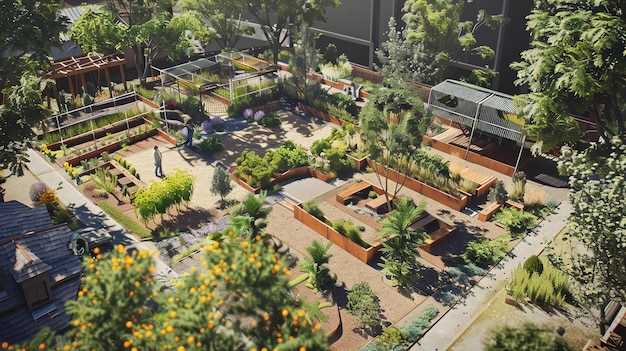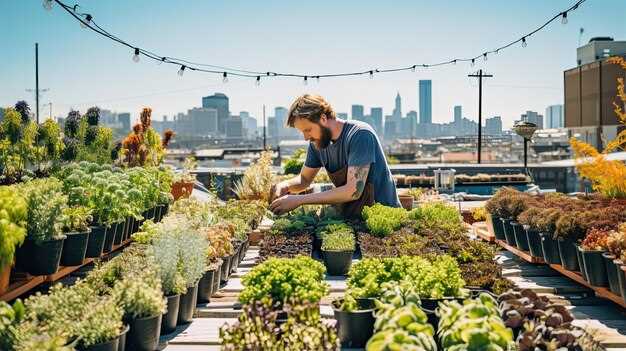
Amidst the concrete jungle that defines our urban landscapes, a hidden oasis awaits. A sanctuary where individuals from diverse backgrounds come together, united by a common passion for nurturing the earth and fostering a sense of belonging. These vibrant and dynamic spaces, known as community gardens, have emerged as powerful catalysts for connection and wellness in our bustling cities.
Within the boundaries of these green havens, a tapestry of life unfolds. The symphony of colors, scents, and textures intertwines, creating a sensory experience that awakens the soul. As the sun’s rays dance upon the leaves, a sense of tranquility envelops those who enter, offering respite from the fast-paced rhythm of urban living.
But community gardens are more than just a feast for the senses. They serve as fertile ground for personal growth and empowerment. Here, individuals of all ages and backgrounds come together, their hands united in a shared purpose. Through the act of tending to the earth, a profound connection is forged – a connection that transcends language barriers, cultural differences, and societal divides.
These green spaces not only cultivate a sense of belonging, but they also nourish the body and mind. As one delves into the art of gardening, a newfound appreciation for the natural world blossoms. The therapeutic benefits of working with the soil and witnessing the fruits of one’s labor are undeniable. Stress melts away, replaced by a sense of accomplishment and fulfillment. In this symbiotic relationship between humans and nature, both parties thrive.
Community Gardens: Fostering Relationships and Enhancing Wellbeing in Urban Environments
In this section, we will explore the profound impact of community gardens on urban spaces, focusing on how these green spaces promote social connections and contribute to the overall wellness of individuals and communities.
Community gardens serve as vibrant hubs where people from diverse backgrounds come together, fostering a sense of belonging and camaraderie. These green oases provide a platform for individuals to interact, share knowledge, and collaborate on gardening projects. By engaging in collective activities such as planting, weeding, and harvesting, participants develop meaningful relationships and establish a strong support network.
Moreover, community gardens offer a sanctuary for individuals seeking solace from the fast-paced urban lifestyle. These serene environments provide a respite from the concrete jungle, allowing people to reconnect with nature and find inner peace. Engaging in gardening activities has been shown to reduce stress levels, improve mental health, and enhance overall wellbeing. The act of nurturing plants and witnessing their growth instills a sense of accomplishment and fulfillment, boosting self-esteem and promoting a positive mindset.
Additionally, community gardens play a vital role in promoting sustainable living practices and environmental stewardship. By cultivating their own fruits, vegetables, and herbs, individuals reduce their reliance on mass-produced, resource-intensive food systems. This not only contributes to a healthier diet but also reduces carbon emissions associated with transportation and packaging. Furthermore, community gardens often incorporate composting and rainwater harvesting techniques, minimizing waste and conserving water resources.
Community gardens are not only spaces for growing plants but also catalysts for personal growth and community development. These green havens foster connections, nurture wellbeing, and inspire individuals to become active participants in creating a greener and more harmonious urban environment.
| Benefits of Community Gardens: | Examples of Community Garden Initiatives: |
|---|---|
| 1. Social cohesion and community building | 1. The Brooklyn Grange Rooftop Farm in New York City |
| 2. Improved mental health and stress reduction | 2. The Guerilla Gardeners movement in London |
| 3. Sustainable living and environmental awareness | 3. The Incredible Edible movement in Todmorden, UK |
| 4. Access to fresh, organic produce | 4. The City Farmer’s Market in Vancouver, Canada |
The Rise of Community Gardens in Urban Areas
In recent years, there has been a notable increase in the popularity and prevalence of community gardens within urban environments. These green spaces, which foster a sense of connection and well-being, have become a significant part of urban landscapes. This article explores the reasons behind the rise of community gardens in urban areas and the positive impact they have on individuals and communities.
1. Reconnecting with Nature
One of the primary reasons for the emergence of community gardens in urban areas is the desire to reconnect with nature. As cities continue to expand and concrete jungles replace green spaces, people are increasingly seeking ways to bring nature back into their lives. Community gardens provide an opportunity for individuals to engage in gardening activities, cultivate plants, and experience the joy of nurturing life.
2. Promoting Sustainable Living
Community gardens also play a crucial role in promoting sustainable living practices within urban areas. By growing their own food and adopting organic gardening methods, individuals reduce their reliance on industrial agriculture and contribute to a more sustainable food system. These gardens serve as a platform for education and awareness, empowering urban dwellers to make environmentally conscious choices.
- Encouraging social interaction and cohesion
- Improving mental and physical well-being
- Enhancing food security and access to fresh produce
- Beautifying urban landscapes and reducing pollution
- Fostering a sense of ownership and pride in the community
In conclusion, the rise of community gardens in urban areas reflects a growing desire to reconnect with nature, promote sustainable living, and enhance the overall well-being of individuals and communities. These green spaces not only provide a sanctuary amidst the concrete jungle but also serve as catalysts for positive change and connection within urban environments.
Creating Green Oases in Concrete Jungles
Transforming urban landscapes into vibrant and lush environments is a growing movement that aims to bring nature back to the heart of our cities. In the midst of concrete jungles, the concept of creating green oases emerges as a way to reconnect with the natural world and foster a sense of tranquility and well-being.
These green oases, often referred to as urban sanctuaries or verdant retreats, serve as havens amidst the hustle and bustle of city life. They provide a respite from the monotony of gray buildings and offer a space for individuals to reconnect with nature, fostering a sense of peace and serenity.
By incorporating elements such as community gardens, rooftop green spaces, and vertical gardens, these urban sanctuaries not only enhance the aesthetic appeal of the city but also provide numerous benefits to its inhabitants. They improve air quality, mitigate the urban heat island effect, and promote biodiversity by attracting birds, butterflies, and other pollinators.
Moreover, these green oases serve as gathering places for communities, fostering a sense of connection and camaraderie among residents. They provide opportunities for individuals to come together, share knowledge, and engage in activities that promote physical and mental well-being.
Creating green oases in concrete jungles requires a collaborative effort between city planners, community organizations, and residents. It involves transforming underutilized spaces into vibrant and thriving gardens, utilizing innovative techniques such as vertical farming and hydroponics to maximize limited space.
As cities continue to grow and urbanization intensifies, the importance of creating green oases becomes even more crucial. They not only contribute to the overall well-being of individuals but also play a significant role in creating sustainable and livable cities for future generations.
The Benefits of Community Gardens for Mental Health

Exploring the positive impact of community gardens on mental well-being, this section delves into the various ways in which these green spaces contribute to the enhancement of individuals’ psychological health. By fostering a sense of belonging, promoting stress reduction, and providing opportunities for physical activity and social interaction, community gardens offer a unique environment that supports mental wellness.
Promoting a Sense of Belonging
Community gardens create a sense of belonging by bringing together individuals from diverse backgrounds and fostering a shared purpose. These spaces provide a platform for people to connect with others who share a common interest in gardening and sustainable living. By working together towards a common goal, community gardeners develop a sense of camaraderie and belonging, which can have a positive impact on their mental well-being.
Reducing Stress and Enhancing Relaxation
Engaging in gardening activities within community gardens offers a natural and therapeutic way to reduce stress and promote relaxation. The act of tending to plants, nurturing them, and witnessing their growth can have a calming effect on the mind. The peaceful and serene environment of community gardens provides an escape from the hustle and bustle of urban life, allowing individuals to unwind and find solace in nature.
- Engaging in gardening activities within community gardens offers a natural and therapeutic way to reduce stress and promote relaxation.
- The act of tending to plants, nurturing them, and witnessing their growth can have a calming effect on the mind.
- The peaceful and serene environment of community gardens provides an escape from the hustle and bustle of urban life, allowing individuals to unwind and find solace in nature.
Moreover, the physical exertion involved in gardening can release endorphins, the body’s natural mood-boosting chemicals, further contributing to stress reduction and overall mental well-being.
Additionally, community gardens often serve as a sanctuary for individuals seeking respite from the pressures of daily life. These green spaces offer a tranquil retreat where individuals can engage in mindful activities, such as meditation or simply enjoying the beauty of nature, promoting a sense of inner peace and mental clarity.
In conclusion, community gardens provide numerous benefits for mental health by fostering a sense of belonging, promoting stress reduction, and offering opportunities for relaxation and rejuvenation. These green spaces serve as vital resources for individuals seeking to enhance their psychological well-being and connect with nature and their community.
Fostering Social Connections through Gardening

Gardening has the remarkable ability to bring people together, creating a sense of belonging and fostering social connections. By engaging in this shared activity, individuals can form meaningful relationships, strengthen community bonds, and enhance their overall well-being.
When individuals come together to garden, they have the opportunity to connect with others who share a common interest. Through conversations and shared experiences, they can build friendships and develop a sense of camaraderie. Gardening provides a platform for people to connect on a deeper level, as they work towards a common goal of nurturing and cultivating plants.
Furthermore, gardening encourages collaboration and cooperation. Whether it’s sharing tools, exchanging gardening tips, or working together on larger projects, individuals can learn from one another and support each other’s growth. This collaborative spirit not only strengthens social connections but also promotes a sense of unity within the community.
In addition to fostering social connections, gardening also offers a space for personal growth and self-expression. As individuals tend to their plants, they can develop a sense of pride and accomplishment. Gardening allows individuals to express their creativity and nurture their own unique garden spaces, reflecting their personal tastes and preferences.
Moreover, gardening provides opportunities for intergenerational connections. It brings together people of different ages, allowing for the exchange of knowledge and experiences. Older generations can pass down their wisdom and expertise to younger ones, while younger individuals can bring fresh perspectives and innovative ideas to the gardening community.
In conclusion, gardening serves as a powerful tool for fostering social connections. By engaging in this shared activity, individuals can form friendships, collaborate with others, and create a sense of belonging within their community. Through gardening, people can cultivate not only plants but also meaningful relationships, ultimately enhancing their overall well-being.
Promoting Sustainable Living and Food Security
Encouraging environmentally-friendly lifestyles and ensuring access to nutritious food are key goals of community gardens. By fostering sustainable living practices and addressing food security issues, these urban spaces play a vital role in promoting a healthier and more resilient community.
One of the main benefits of community gardens is their contribution to sustainable living. These green spaces provide opportunities for individuals to engage in organic gardening, composting, and water conservation practices. By cultivating their own fruits, vegetables, and herbs, community members can reduce their reliance on commercially-produced food, thereby minimizing the environmental impact associated with large-scale agriculture. Additionally, community gardens often promote the use of natural fertilizers and pest control methods, further enhancing their sustainability.
Food security is another crucial aspect addressed by community gardens. These spaces offer a solution to the lack of access to fresh and affordable produce in urban areas, commonly known as food deserts. By growing their own food or participating in communal harvests, community gardeners can ensure a steady supply of nutritious options, regardless of their income or proximity to grocery stores. This not only improves the overall health and well-being of individuals but also fosters a sense of empowerment and self-sufficiency within the community.
Moreover, community gardens often collaborate with local food banks and organizations to distribute surplus produce to those in need. This not only reduces food waste but also contributes to the fight against hunger and malnutrition. By actively engaging in food security initiatives, community gardens become catalysts for positive change, addressing systemic issues and promoting equity in access to healthy food.
| Sustainable Living | Food Security |
|---|---|
| Organic gardening | Access to fresh produce |
| Composting | Reducing reliance on commercial food |
| Water conservation | Empowerment and self-sufficiency |
| Natural fertilizers and pest control | Collaboration with food banks |
Empowering Communities through Urban Gardening Initiatives
Enhancing the strength and resilience of urban neighborhoods by fostering a sense of empowerment and connection through innovative gardening initiatives.
Creating Sustainable Change
By implementing urban gardening initiatives, communities are given the opportunity to take control of their own well-being and create sustainable change. These initiatives provide a platform for individuals to actively participate in the cultivation of their surroundings, fostering a sense of ownership and pride in their community.
Fostering Social Cohesion
Urban gardening initiatives serve as a catalyst for social cohesion, bringing together individuals from diverse backgrounds and fostering a sense of unity. Through shared gardening experiences, people are able to connect, exchange knowledge, and build relationships, breaking down barriers and creating a stronger sense of community.






